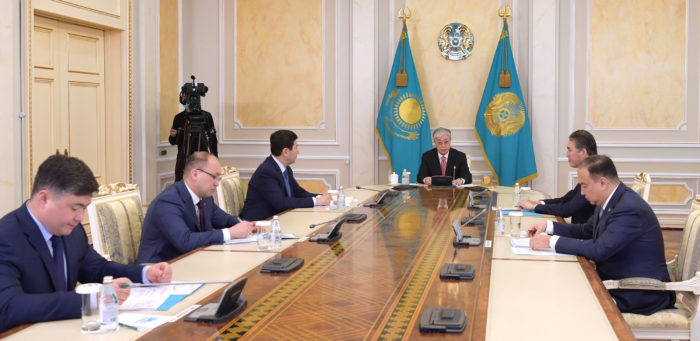Kazakhstan ended the state of emergency on May 11, but decided to keep lockdown measures in place until the situation improves in each region, according to Kazakh President Kassym-Jomart Tokayev during a meeting with the government commission that will now become dedicated to leading the economic recovery effort.

Tokayev chairs government commission on the state of emergency. Photo credit Akorda press service
The state of emergency was first declared on March 15 and later extended through May 11.
“Starting today (May 11), some shops will be opened throughout the country. Beauty salons, education centers, and other facilities will reopen. Parks will reopen too. Flights were resumed. At the same time, we all must continue taking preventive measures in our daily lives. Social distancing and wearing masks in public places should become a norm,” said Tokayev.
More than 1.1 million citizens have returned to work, as soon as some businesses were allowed to reopen. Coronavirus still remains a threat, as the possibility of a second wave persists.
The country will now have to deal with the shocks its economy has had to face since March, including a total collapse in oil prices, which are absolutely critical for an oil-rich nation heavily dependent on its oil revenues.
The government recently announced it will allocate nearly six trillion tenge (US$14.2 billion) to prop up the economy, including businesses that had to close and thousands of citizens who lost their incomes during the lockdown.
More than 4.5 million people received financial assistance of 42,500 tenge (US$101), more than one million people received basic products and nearly two million citizens got their loans postponed.
Tokayev said the country possesses sufficient financial resources to weather the storm.
“I want to outline our priorities in the crisis and post-crisis period. We are taking measures to protect the health of all citizens, support incomes, support and develop businesses, and take measures to improve education and science,” said the Kazakh president.
“We need to build a new economic structure as soon as possible,” said Tokayev, stressing the need to revise the role of each sector.
The energy sector will require significant reforms with a medium-term goal to move to green energy. In 2019, the government committed to bringing renewable energy to three percent of its domestic power mix by 2020 and 50 percent by 2050.
Tokayev also committed his government to more infrastructure projects.
The development of the agricultural sector that employs nearly 20 percent of the country’s population is important to ensure food security. The KazAgro company will be overseeing agriculture financing and lending, and the government will increase access to capital through off-take agreements.
Kazakhstan will also allocate up to one trillion tenge (US$2.4 billion) to its Employment Road Map program.
“This is a huge sum of money. It will be used to provide loans to businesses. Their use should be absolutely targeted under the control of the relevant bodies. The projects financed in this difficult time should, first of all, create jobs,” said Tokayev.
Affordable housing is also on the agenda and is meant to become a driver for economic development, employment growth, and social support.
Tokayev is spearheading the launch of a 5-10-20 housing program and said that the government will allocate 390 billion tenge (US$926.7 million) for this purpose from the country’s anti-crisis fund. The plan for this year is to build 15 million square meters or 150,000 apartments and houses.
“By the end of the year, the government should establish an Otbasy Bank (Family Bank), a full-fledged development and support institute that will register and distribute housing. The plan calls for to using part of the country’s pension savings to improve housing conditions and will be a continuation of systemic transformations in this area. I gave such an order previously but the discussion was delayed due to the state of emergency. It’s time to make a push ahead with this,” said Tokayev.
Kazakhstan will also consider introducing a progressive income tax for the sake of “social justice.”
“Progressive scale means that citizens with low salaries will pay less than today and for highly paid workers the amount of tax paid will increase. Our main goal is to move a massive, non-transparent lower-wage segment out of the ‘shadows.’ If their rate is cut, then there will be less incentive to under the table,” explained Tokayev.
To support its businesses, Kazakhstan’s Damu Development Bank may receive a capital boost to be able to lend more.
“To expand lending, the Agency for Regulation and Development of the Financial Market took measures to weaken prudential standards and reduce pressure on liquidity. This allowed for an injection of nearly 600 billion tenge (US$1.4 billion) in the banking sector, which should be directed to the country’s economy. An additional set of temporary prudential measures should be developed that expand the ability of banks to lend to the economy,” said Tokayev.

